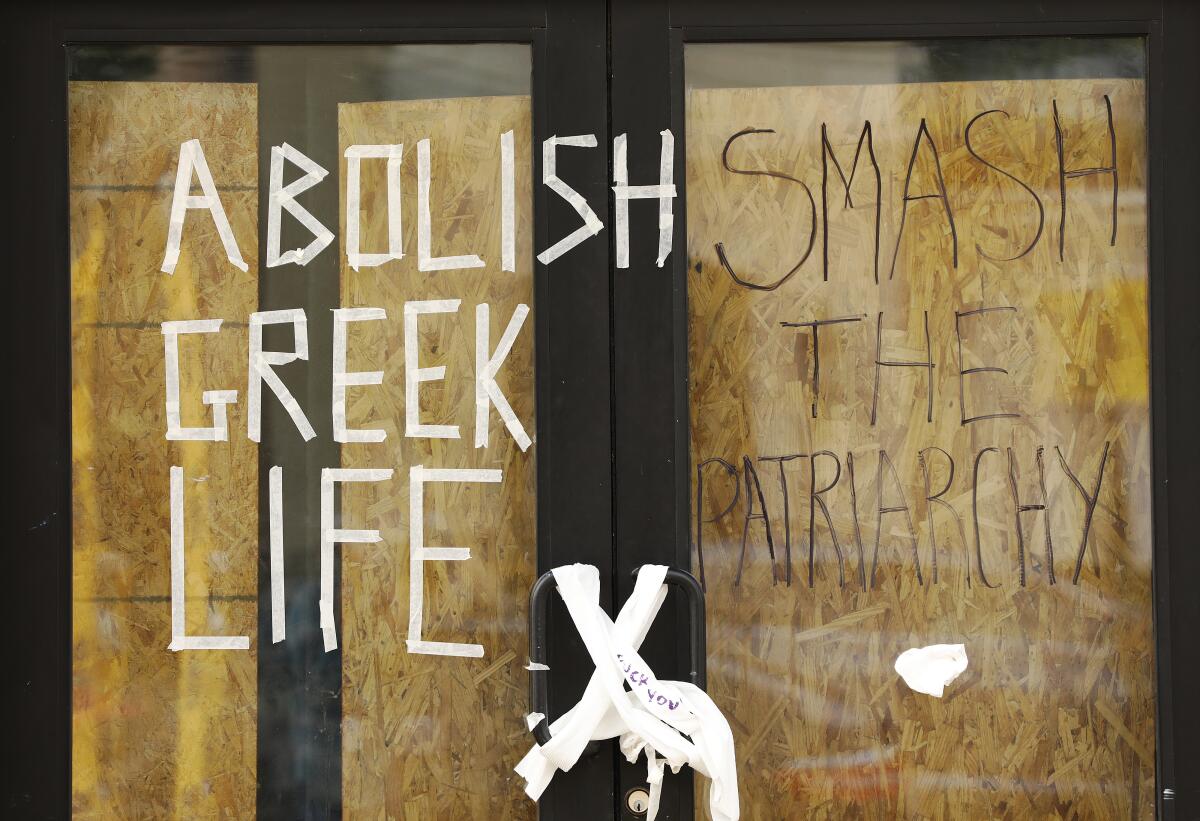Fraternities are incubators of sexual assault and other violence. Why is USC defending them?

- Share via
The recent allegations of druggings and sexual assault at a USC fraternity didn’t surprise me or other USC alumni who remember the parties on Greek row. They’ve long been incubators of rape and other violence.
The few times I attended a frat party, my friends and I went in groups, fearing what might happen. We kept an eye on one another and our drinks. The predominantly white fraternity members wouldn’t let us bring male friends unless the women far outnumbered them.
In dark and beer-drenched rooms, the predatory culture was palpable. Men ogled and appraised us. They cornered women who stumbled in drunkenness. With lucid sneers, they groped and grinded on women who were half-responsive. Some had to be rescued from molesters by their friends.
The latest scandal, with allegations of rape at the Sigma Nu fraternity house, arises after apparently willful ignorance by a new regime of campus leaders.
I recall leaving the parties thoroughly creeped out. I felt safer on the street, where we were regularly warned of muggings and assaults, than I did inside those houses on Greek row.
Studies have found fraternity men are three times more likely to rape women than nonaffiliated classmates. Most gang rapes reported on campus are tied to fraternities. Women in sororities are 74% more likely to be raped than other college women.
Still, USC continues to endorse Greek life, despite its central role in a culture of assault and mass traumatization of women. It’s not hard to guess why. Alumni of the Greek system are important to university fundraising and former members have power in many spheres. Greek alumni donate four times more than nonaffiliated peers to colleges. Most U.S. senators and Fortune 500 CEOs are fraternity members.
“Fraternities are protected not just by their race but by their privilege,” Nicholas Syrett, a gender studies professor at the University of Kansas, told me. These students “are by and large more privileged than most college students because they can afford to join fraternities in the first place.”
At a Zoom town hall last week, USC officials again acknowledged delaying nearly a month before notifying the campus community of allegations of drugging and assault at the Sigma Nu fraternity on Sept. 24. During that period of silence, another student reported a sexual assault at the frat.
USC students, fed up with the administration’s failures, are calling for abolishing fraternities, as are students at many other universities nationwide. Yet at the town hall, USC Provost Charles Zukoski seemed not to understand the systemic problem. He insisted: “It is individuals who commit crimes, it isn’t the entire organization.”
The provost’s comment reflects willful denial or ignorance. As Ibram X. Kendi, a Boston University professor and author, noted in a trenchant essay, when it comes to gangs, entire communities are vilified. But with frats, violent acts are cast as individual problems, as aberrations.
Opinion Columnist
Jean Guerrero
Jean Guerrero is the author, most recently, of “Hatemonger: Stephen Miller, Donald Trump and the White Nationalist Agenda.”
Failing to recognize the deep-rooted, systemic nature of rape culture in the Greek system allows it to continue hurting people. At USC, 29.7% of female undergraduates reported sexual penetration or touching that involved force or incapacitation by alcohol or drugs.
I was recently sent a batch of 2008 emails between USC frat members, where misogyny and racism are simply routine. In the emails, Kappa Sigma members called women “beat bitches” and “slutty disease carrying tramps.” Parties were described as markets for sex: “Come out get drunk and get your dick wet.” The emails also included homophobic and racist slurs.
This toxic version of masculinity, which spreads beyond fraternities, celebrates coercion of women. In “The Company He Keeps: A History of White College Fraternities,” Syrett writes, “To fully prove oneself in some fraternities, the sex act must itself be perceived as exploitative.”
In a frat house, coercion is easy because of the proximity to the bedroom, where women are often pushed from “this super intense, energetic, alcohol-saturated space,” said Nicole Scruggs, a 22-year-old USC senior and former sorority member who favors banning the Greek system from campus.
Scruggs told me Greek life conventions give fraternities more power than sororities to dictate where and how socializing happens. “It creates a binary between men and women in which women are the prey, and as prey, women basically learn to view themselves as objects of sexual pleasure rather than independent human beings,” she said. “This leads not only to rape culture but to women not considering themselves to be victims after a case of harassment or rape.”
A recent survey shows a majority of USC students who are sexually harassed don’t contact university resources. My classmate Ashley, a 33-year-old USC alumna, recalls being raped at a fraternity party her senior year and telling herself to shrug it off. “You’re kind of brainwashed, especially when you’re a part of Greek life, to think this is all so normal,” she told me. “I thought it was my fault.”
She explained that rape culture at fraternities is entwined with sorority culture, where first-year students are presented to frats as a means to socially promote the sorority based on their looks. At the same time, she adds, “You get punished for being sexually open or acting in a way they perceive to not be appropriate. So that really induced a lot of shame. I internalized it: ‘I’m a slut, that’s just who I am.’”
She said USC’s delay in responding to allegations at Sigma Nu “contributes to the culture of feeling like it’s not even worth saying anything.”
What to know about multiple allegations of drugging, sexual assaults at USC’s Sigma Nu
The culture of male impunity that failed to stop alleged assaults by the campus gynecologist George Tyndall — for which USC agreed to pay $1.1 billion to his former patients — is the same one that minimizes fraternity abuse at the university.
USC has suspended Sigma Nu and is enforcing a pause to fraternity parties, but it’s not about a few bad apples. It’s about organizations structured to dehumanize and endanger women at university-sanctioned events.
Opponents of abolishing fraternities argue that such a move would push parties underground and make them harder to monitor. But USC leaders haven’t been able to reform the culture. By refusing to ban Greek life, they’re enabling the mass mistreatment and molestation of women.
More to Read
A cure for the common opinion
Get thought-provoking perspectives with our weekly newsletter.
You may occasionally receive promotional content from the Los Angeles Times.













